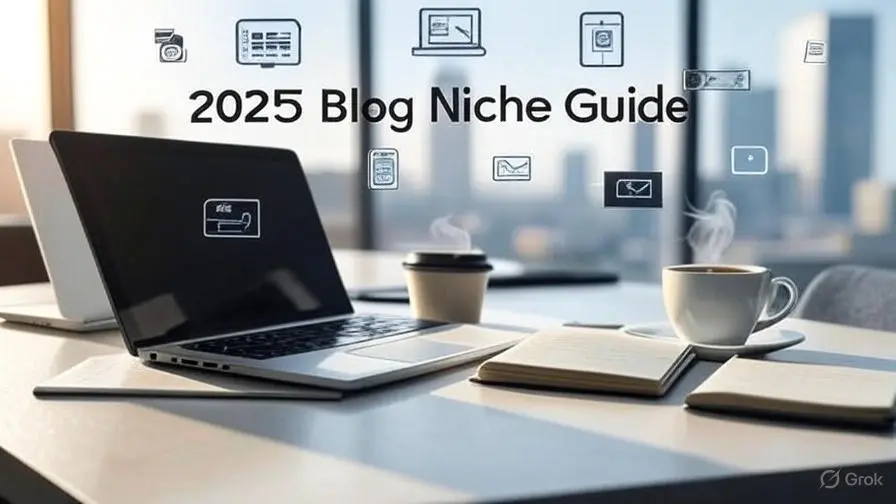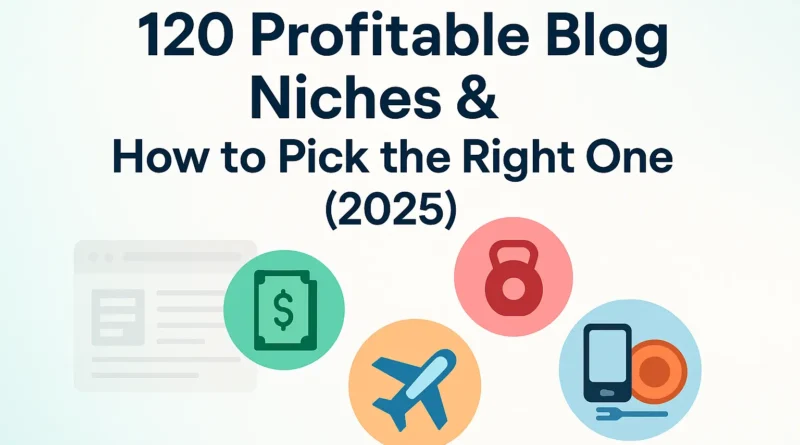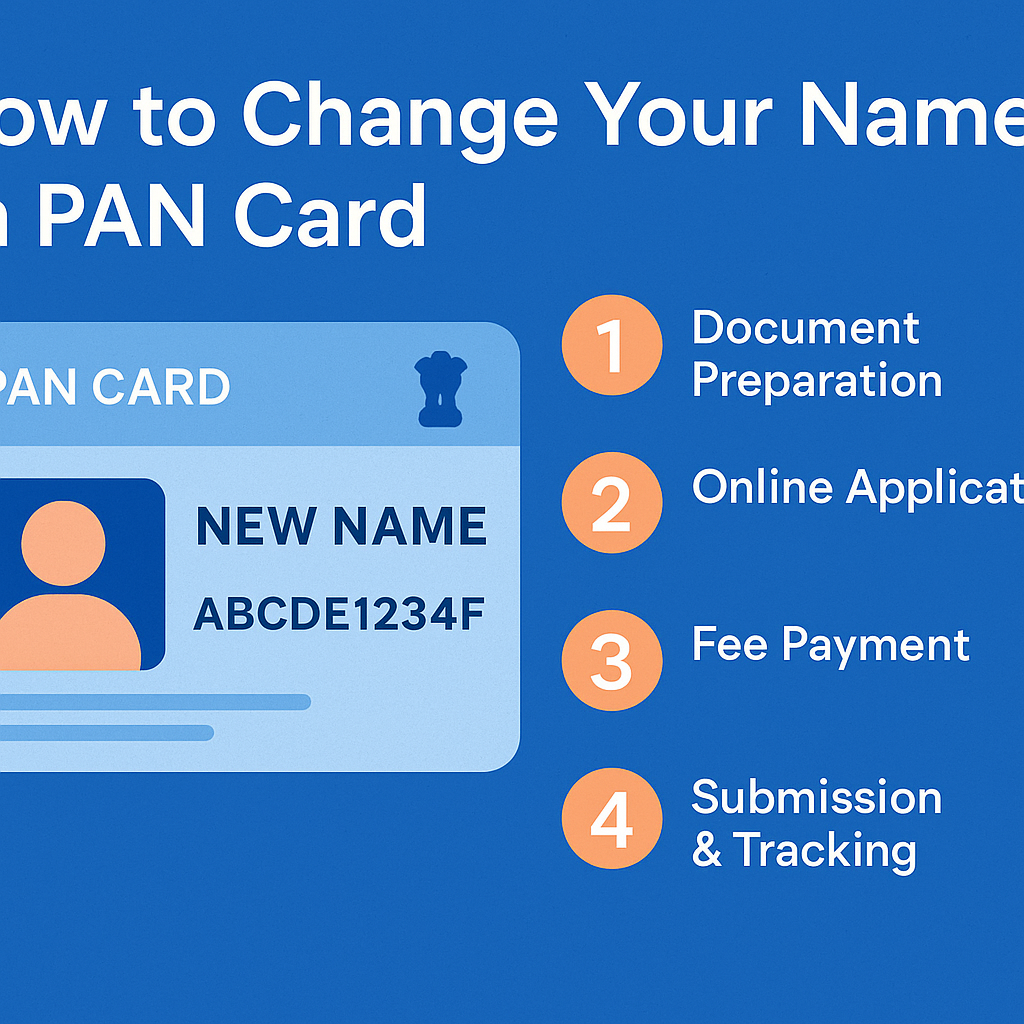120 Profitable Blog Niche Ideas & How to Pick the Right One (2025 Guide)
Are you dreaming of starting a blog in 2025 but unsure which niche will bring success? Choosing a profitable blog niche is the foundation of a thriving blog, blending your passion with audience demand and monetization potential. In this comprehensive guide, we’ve compiled 120 profitable blog niche ideas for 2025, backed by data-driven trends, and a step-by-step process to pick the perfect niche for you. Whether you’re a beginner or a seasoned blogger, this guide will help you find a niche that’s both lucrative and sustainable.
Why Choosing the Right Blog Niche Matters in 2025
A well-chosen blog niche sets the stage for consistent traffic, engagement, and revenue. In 2025, blogging is more competitive than ever, with Google prioritizing Expertise, Experience, Authoritativeness, and Trustworthiness (E-E-A-T), especially for Your Money or Your Life (YMYL) niches like finance and health. A focused niche helps you:
- Rank higher on search engines by targeting specific keywords.
- Build a loyal audience by addressing their pain points.
- Monetize through affiliate marketing, ads, digital products, or services.
This guide leverages insights from tools like Semrush, Google Trends, and industry analyses to ensure you pick a niche with high demand and low-to-moderate competition.

120 Profitable Blog Niche Ideas for 2025
Below are 120 blog niche ideas for 2025, organized into categories with high search volume, monetization potential, and growth trends. Each niche is selected based on current data, advertiser interest (high CPC), and audience demand.
Personal Finance Niches
Personal finance remains an evergreen, high-CPC niche with strong affiliate opportunities. Audiences seek actionable advice on managing money, investing, and achieving financial freedom.
- Budgeting and Saving Tips – Practical strategies for cutting expenses.
- Financial Independence/Retire Early (FIRE) – Guides for early retirement.
- Cryptocurrency Investing – Insights on Bitcoin, Ethereum, and altcoins.
- Debt Management – Strategies to pay off credit cards and loans.
- Retirement Planning – Long-term savings and pension advice.
- Stock Market Investing – Stock analysis and portfolio tips.
- Real Estate Investing – Rental properties, flipping, and REITs.
- Side Hustles – Gig economy and freelance income ideas.
- Personal Finance for Millennials – Tailored advice for younger generations.
- Frugal Living – Minimalist budgeting and thrifty lifestyles.
- Credit Score Improvement – Tips to boost credit ratings.
- Tax Optimization – Legal ways to reduce tax liabilities.
- Passive Income Streams – Online businesses, dividends, and royalties.
- Financial Planning for Families – Budgeting for kids and emergencies.
- Investing for Beginners – Simplified guides for new investors.
- Dividend Investing – Building wealth through dividends.
- Personal Finance for Women – Addressing gender-specific financial challenges.
- Student Loan Repayment – Strategies to tackle student debt.
- Money Mindset – Overcoming financial fears and building wealth.
- Sustainable Investing (ESG) – Ethical and green investment options.
Monetization Tip: Promote budgeting apps (e.g., YNAB), investment platforms (e.g., Robinhood), or online courses via affiliate links.
Health and Wellness Niches
Health and wellness niches thrive due to universal demand for better living. Note: YMYL niches require credible expertise to rank well.
- Mental Health and Mindfulness – Coping with anxiety and stress.
- Nutrition and Healthy Eating – Meal plans and dietary tips.
- Fitness for Busy Professionals – Quick workouts for desk jobs.
- Yoga and Meditation – Beginner-friendly poses and mindfulness.
- Holistic Health – Natural remedies and alternative therapies.
- Weight Loss for Specific Groups – Postpartum or senior weight loss.
- Vegan and Plant-Based Diets – Recipes and nutrition guides.
- Gut Health – Probiotics and digestive wellness.
- Chronic Illness Management – Tips for conditions like diabetes.
- Sleep Optimization – Improving sleep quality and routines.
- Stress Relief Techniques – Breathing exercises and relaxation.
- Fitness for Seniors – Low-impact exercises for older adults.
- Prenatal and Postnatal Wellness – Health for new moms.
- Biohacking – Optimizing body and mind performance.
- Skincare Routines – Anti-aging and natural skincare tips.
- Haircare and Growth – Solutions for hair loss and styling.
- Men’s Grooming – Beard care and skincare for men.
- Women’s Health – PCOS, menopause, and fertility advice.
- Personalized Health – DNA-based fitness and nutrition plans.
- Natural Remedies – Herbal supplements and home cures.
Monetization Tip: Partner with wellness brands (e.g., supplements, fitness gear) or sell e-books on niche-specific health plans.
Technology and AI Niches
Tech and AI are booming, with high CPCs and growing search interest due to advancements in 2025.
- AI Tools and Applications – Reviews of AI writing or design tools.
- Blockchain and Web3 – Decentralized apps and NFTs.
- Cryptocurrency and DeFi – Decentralized finance strategies.
- Cybersecurity – Protecting against hacks and data breaches.
- Software Reviews – Comparing tools like CRMs or project management apps.
- Gadget Reviews – Smartphones, smart home devices, and wearables.
- Cloud Computing – AWS, Azure, and SaaS solutions.
- AI in Content Creation – Tools like Jasper or MidJourney.
- Ethical Hacking – Cybersecurity training for beginners.
- Tech for Small Businesses – Affordable tech solutions.
- Internet of Things (IoT) – Smart home and industrial applications.
- Augmented Reality (AR/VR) – Gaming and professional uses.
- 5G Technology – Impacts on connectivity and business.
- Tech Career Advice – Landing jobs in tech industries.
- Coding Tutorials – Python, JavaScript, and more for beginners.
- Machine Learning for Non-Experts – Simplified ML concepts.
- Tech Startups – Launching and scaling tech businesses.
- Data Science and Analytics – Tools and career tips.
- Smart Home Automation – DIY home tech setups.
- Wearable Tech Trends – Fitness trackers and smartwatches.
Monetization Tip: Promote tech courses (e.g., Udemy) or software subscriptions with high affiliate payouts.
Digital Marketing Niches
Digital marketing niches attract businesses and bloggers, offering high CPCs and affiliate opportunities.
- Search Engine Optimization (SEO) – Ranking strategies and tools.
- Content Marketing – Creating engaging blog content.
- Social Media Marketing – Growing brands on platforms.
- Email Marketing – Building lists and campaigns.
- Affiliate Marketing – Earning commissions through promotions.
- Influencer Marketing – Collaborating with influencers.
- E-commerce Marketing – Shopify and Amazon strategies.
- PPC Advertising – Google Ads and Facebook Ads tips.
- Conversion Rate Optimization – Boosting website conversions.
- Digital Marketing for Small Businesses – Budget-friendly strategies.
- Video Marketing – YouTube SEO and video creation.
- Podcasting for Business – Growing brands via podcasts.
- Personal Branding – Building an online presence.
- SEO for Bloggers – Beginner-friendly SEO tips.
- Marketing Automation – Tools like HubSpot or Mailchimp.
- TikTok Marketing – Viral content strategies.
- Instagram Growth Hacks – Reels and follower growth.
- LinkedIn for Professionals – Networking and lead generation.
- Web Analytics – Google Analytics and tracking tips.
- Dropshipping Marketing – Promoting dropshipping stores.
Monetization Tip: Promote marketing tools (e.g., Semrush, Ahrefs) or create courses on SEO and social media.
Lifestyle and Travel Niches
Lifestyle and travel niches appeal to aspirational audiences and are highly visual, perfect for social media integration.
- Sustainable Travel – Eco-friendly travel tips.
- Luxury Travel – High-end destinations and experiences.
- Budget Travel – Affordable vacation planning.
- Solo Travel for Women – Safety and adventure tips.
- Family Travel – Kid-friendly destinations and itineraries.
- Digital Nomad Lifestyle – Working remotely while traveling.
- Adventure Travel – Hiking, diving, and extreme sports.
- Cultural Travel – Immersive cultural experiences.
- Food Tourism – Culinary travel and foodie guides.
- Minimalist Lifestyle – Simplifying life and decluttering.
- Van Life – RV and van travel adventures.
- Travel Photography – Tips for capturing stunning shots.
- Destination Weddings – Planning and vendor tips.
- Eco-Friendly Living – Sustainable home practices.
- Sustainable Fashion – Ethical clothing brands.
- Home Organization – Decluttering and storage solutions.
- Urban Gardening – Small-space gardening tips.
- Pet Care and Training – Dog and cat care advice.
- Parenting and Family Life – Tips for modern families.
- Thrifting and Second-Hand Fashion – Budget-friendly style.
Monetization Tip: Use affiliate links for travel gear, booking platforms (e.g., Booking.com), or sell travel itineraries.
Education and Career Niches
Education and career niches cater to professionals and students seeking growth and opportunities.
- Online Learning Platforms – Reviews of Udemy, Coursera, etc.
- Homeschooling Resources – Curriculum and teaching tips.
- Study Tips and Productivity – Hacks for students.
- Career Change Advice – Transitioning to new industries.
- Freelancing Tips – Building a freelance career.
- Job Interview Preparation – Resume and interview skills.
- College Prep – Admissions and scholarship advice.
- Professional Development – Leadership and soft skills.
- Entrepreneurship for Teens – Starting young businesses.
- Remote Work Strategies – Tools and productivity tips.
Monetization Tip: Promote online courses or career coaching services.
Hobbies and Creative Pursuits
Hobby niches attract passionate audiences willing to spend on their interests.
- Video Gaming and Esports – Game reviews and tips.
- DIY Crafts – Home decor and craft tutorials.
- Photography Tutorials – Beginner and advanced techniques.
- Gardening and Urban Farming – Growing food at home.
- Anime and Manga Reviews – Guides for fans.
- Book Reviews – Literary analysis and recommendations.
- Creative Writing Tips – Storytelling and publishing advice.
- Board Games and RPGs – Tabletop gaming guides.
- Collectibles – Vinyl records, comics, and memorabilia.
- Outdoor Survival – Prepping and wilderness skills.
Monetization Tip: Sell DIY guides, craft templates, or affiliate gaming gear.

How to Pick the Right Blog Niche in 2025
Choosing a niche requires balancing your passion, audience demand, and monetization potential. Follow this 4-step framework to make an informed decision:
Step 1: Identify Your Passion and Expertise
- Why: Blogging demands consistent content creation, so choose a topic you love or can learn deeply. Expertise is critical for YMYL niches to meet Google’s E-E-A-T standards.
- How: List topics you’re knowledgeable about or enjoy researching. Ask yourself: What could I write about for years without losing interest?
- Example: A teacher might choose “homeschooling resources” to leverage their expertise.
Pro Tip: If you lack expertise in a YMYL niche (e.g., health), partner with credentialed experts to boost credibility.
Step 2: Validate Audience Demand
- Why: A niche must have an audience actively searching for solutions. High search volume and low-to-moderate competition ensure faster ranking.
- How: Use tools like Google Trends, Semrush, or Ahrefs to check:
- Search Volume: Aim for 5,000–50,000 monthly searches.
- Keyword Difficulty (KD): Target KD scores of 0–30 for easier ranking.
- Cost-Per-Click (CPC): Higher CPC (above $1.50) indicates monetization potential.
- Example: “Sustainable investing” has 8,100 monthly searches, KD of 25, and CPC of $4.50, making it a strong niche.
Pro Tip: Search Reddit or Quora for niche-related questions to uncover audience pain points.
Step 3: Assess Monetization Potential
- Why: Profitable niches offer multiple revenue streams, such as affiliate marketing, ads, or digital products.
- How: Research affiliate programs (e.g., Amazon Associates, ClickBank), ad networks (e.g., Mediavine), and competitors’ monetization strategies. Check if audiences spend money in the niche.
- Example: Personal finance blogs can promote apps like Mint or sell budgeting templates.
Pro Tip: Niches with high-ticket products (e.g., tech, finance) yield better affiliate commissions.
Step 4: Evaluate Competition and Find a Sub-Niche
- Why: Broad niches (e.g., “fitness”) are highly competitive. Sub-niches with lower competition offer better ranking opportunities.
- How: Use keyword tools to find long-tail keywords with low KD. Add a unique angle to stand out (e.g., “fitness for remote workers” vs. “fitness”).
- Example: Instead of “travel,” focus on “budget travel for digital nomads” (3,200 searches, KD 15).
Pro Tip: Analyze competitors’ content gaps using tools like Ahrefs to find underserved topics.
Top Monetization Strategies for Your Blog in 2025
To turn your blog into a revenue-generating machine, consider these proven monetization methods:
- Affiliate Marketing: Promote products/services for commissions (e.g., financial apps, fitness gear). Use programs like Amazon Associates or ShareASale.
- Digital Products: Sell e-books, courses, or templates (e.g., SEO checklists, travel itineraries).
- Display Ads: Join ad networks like AdSense or Mediavine (requires ~25,000 monthly sessions).
- Sponsored Posts: Partner with brands for paid content (e.g., travel gear reviews).
- Coaching/Services: Offer personalized advice (e.g., financial planning, career coaching).
Common Mistakes to Avoid When Choosing a Niche
- Choosing a Niche That’s Too Broad: “Lifestyle” is too vague; narrow it to “minimalist lifestyle for families.”
- Ignoring Competition: High-competition niches require more resources to rank.
- Neglecting Passion: A niche you don’t enjoy will lead to burnout.
- Overlooking YMYL Requirements: Health and finance blogs need strong credentials to rank.
- Not Researching Monetization: Ensure your niche has products or services to promote.
Tools to Help You Choose a Blog Niche
- Google Trends: Tracks niche popularity over time (free).
- Semrush/Ahrefs: Analyzes search volume, competition, and CPC (paid).
- AnswerThePublic: Finds niche-related questions and pain points (free/paid).
- Reddit/Quora: Identifies audience needs and trending topics (free).
- BuzzSumo: Analyzes content performance in your niche (paid).
FAQ Section: 120 Profitable Blog Niche Ideas for Beginners in 2025
Here’s a list of frequently asked questions to help beginners start a profitable blog in 2025. These answers provide clear, actionable advice to guide you in choosing the right niche and launching your blog successfully.
1. What is a blog niche, and why is it important for beginners?
A blog niche is a specific topic or focus area your blog covers, like personal finance, fitness, or travel. For beginners, choosing a niche is crucial because it:
- Helps you attract a targeted audience searching for specific solutions.
- Makes it easier to rank on Google by focusing on less competitive keywords.
- Allows you to build expertise and credibility, especially in niches like health or finance.
Example: Instead of blogging about “lifestyle,” focus on “minimalist lifestyle for beginners” to stand out and connect with readers.
2. How do I choose a profitable blog niche as a beginner?
Follow these steps to pick a profitable niche in 2025:
- Identify Your Interests: Choose a topic you’re passionate about or willing to learn (e.g., gardening, freelancing).
- Research Demand: Use free tools like Google Trends to check if people search for your niche (aim for 5,000–50,000 monthly searches).
- Check Monetization: Look for affiliate programs (e.g., Amazon Associates) or products to promote in your niche.
- Analyze Competition: Target low-competition sub-niches using tools like Semrush (keyword difficulty <30).
Pro Tip: Start with a sub-niche like “budget travel for students” instead of broad topics like “travel” to rank faster.
3. What are the most profitable blog niches for beginners in 2025?
Some beginner-friendly, profitable niches for 2025 include:
- Personal Finance for Beginners: Teach budgeting or side hustles (high CPC, ~$5–10).
- DIY Crafts: Share simple projects with affiliate links to craft supplies.
- Freelancing Tips: Guide new freelancers on finding clients (low competition).
- Urban Gardening: Tips for small-space gardening (growing trend).
- Tech for Non-Techies: Reviews of user-friendly gadgets or apps.
These niches have strong monetization potential via affiliates, ads, or digital products and are easier for beginners to rank in.
4. Can I start a blog without experience in my chosen niche?
Yes, beginners can start a blog without deep expertise by:
- Learning as You Go: Research your niche using credible sources (e.g., books, courses) and share your learning journey.
- Partnering with Experts: For YMYL niches (health, finance), collaborate with professionals to boost credibility.
- Focusing on Personal Experience: Blog about your progress (e.g., “my journey to financial freedom”) to connect with readers.
Example: A beginner in fitness could blog about “my first 30 days of home workouts,” sharing relatable tips.
5. How can I make money from my blog as a beginner?
Beginners can monetize their blog in 2025 through:
- Affiliate Marketing: Promote products (e.g., Amazon links for gadgets, books) for commissions (5–20% per sale).
- Display Ads: Join Google AdSense for pay-per-click ads (earns ~$1–5 per 1,000 views).
- Digital Products: Sell simple e-books or templates (e.g., budgeting spreadsheets) for $10–50.
- Sponsored Posts: Partner with small brands once you have traffic (500–1,000 monthly sessions).
Tip: Focus on affiliate marketing first, as it’s beginner-friendly and requires minimal traffic.
6. How long does it take to make money from a blog?
Most beginner bloggers start earning money within 6–12 months with consistent effort (2–3 posts per week). Factors affecting timeline:
- Niche Competition: Low-competition niches (e.g., “urban gardening”) rank faster than broad ones (e.g., “fitness”).
- Content Quality: High-quality, SEO-optimized posts (1,500–2,000 words) attract more traffic.
- Traffic Growth: Aim for 1,000–5,000 monthly sessions to start monetizing with ads or affiliates.
Example: A blog in “freelancing tips” could earn $100/month via affiliates within 6 months with 10–15 targeted posts.
7. What tools do beginners need to research blog niches?
Free and affordable tools to help beginners choose a niche include:
- Google Trends: Tracks niche popularity (free).
- AnswerThePublic: Finds questions people ask about your niche (free limited version).
- Ubersuggest: Shows search volume and keyword difficulty (free/paid).
- Reddit (e.g., r/blogging): Reveals beginner pain points and trending topics (free).
- Semrush/Ahrefs (Free Trials): Analyze competition and monetization potential.
Pro Tip: Start with free tools and upgrade to Semrush ($129/month) once your blog grows.
8. Should I choose an evergreen or trending niche in 2025?
- Evergreen Niches (e.g., personal finance, health): Offer long-term stability and consistent demand but may have higher competition.
- Trending Niches (e.g., AI tools, sustainable travel): Have lower competition and high growth potential but may fade over time.
For Beginners: Start with an evergreen sub-niche (e.g., “budgeting for beginners”) for stability, or blend trends (e.g., “AI for content creators”) for faster traction.
9. How do I know if my blog niche is too competitive?
A niche is too competitive if:
- Keyword Difficulty (KD) is above 30 (check via Semrush or Ahrefs).
- Top-ranking sites have high domain authority (DA >50, e.g., Forbes, Wix).
- Search results are dominated by established blogs with thousands of backlinks.
Solution: Target long-tail keywords (e.g., “blog niche ideas for beginners 2025,” KD ~20) or sub-niches with less competition.
10. Can I change my blog niche later?
Yes, you can pivot your niche, but it’s easier to refine than overhaul:
- Refine: Shift from “fitness” to “fitness for beginners” by updating content and branding.
- Overhaul: Switching from “travel” to “finance” requires new content and may reset SEO progress.
Tip: Test your niche with 10–15 posts before committing. If it feels wrong, pivot early to minimize rework.
Final Thoughts
Starting a blog in 2025 is an exciting opportunity to share your expertise and build a profitable online business. The 120 blog niche ideas above—from personal finance to tech and lifestyle—offer a mix of evergreen and trending topics with high monetization potential. Use the 4-step framework to choose a niche that aligns with your passion, has strong audience demand, and offers multiple revenue streams. Validate your choice with tools like Semrush or Google Trends, and niche down to reduce competition.
Ready to start? Test your niche by writing 3–5 sample posts and sharing them on social media to gauge audience interest. If you’re still unsure, leave a comment with your interests, and I’ll suggest tailored niche ideas!
What niche are you considering for your 2025 blog? Share below, and let’s discuss!
Related Articles for Context
- BitChat: Revolutionizing Decentralized Messaging in 2025
- Tips to Get Hired Faster for Remote Jobs in 2025
- Trending Stocks and ETFs Americans Are Investing In (Mid 2025)
- Netflix vs Disney+ vs Prime Video – Which Streaming Service Wins in 2025?
- Final Destination: Bloodline (2025) – Movie Review & Breakdown of the Franchise’s Bloodiest Return
- Movie Soundtracks That Evoke Strong Emotions – Unforgettable Scores That Touch the Soul
- Initial Report: Plane Crashes at Southend Airport, All Flights Cancelled
- Best ChatGPT Alternatives Thats Works Better
- ElevenLabs – Ultra-Realistic AI Voice Generator (2025 Full Review)
- Make AI Videos in Minutes: How to Create Videos with Sound Using AI in 2025




Blog Comment Creation GuideThis guide does a great job highlighting how crucial niche selection is, especially with how Google’s E-E-A-T framework shapes content visibility in 2025. One tip I’d add from my own experience—before committing to a niche, test a few content ideas to see what actually resonates with your target audience. It can save a ton of time and help fine-tune your direction early on.
Good Day!
We have the honor to propose innovative solution for vibration adjustment of rotor machines – portable balancing device Balanset-1A.
Official product page: https://vibromera.eu/shop/889/
Fields of Use
Balanset-1A is actively applied for vibration adjustment of various types rotor units:
Industrial Machinery:
Fans – manufacturing, centrifugal, radial. Pump Units – screw, water. Motors – synchronous. Turbines – steam. Compressor Units – piston.
Machine Tools:
Tool Spindles – lathe. Grinding Wheels. Roll Equipment of paper machines.
Agro Equipment:
Threshing Drums. Mulchers. Crushing Units for fertilizers.
Special Applications:
Centrifuges – industrial. Blowers. Grinding Equipment. Cardan Shafts.
Technical Specifications
Key Characteristics:
Balancing planes: 1 or 2. Rotation frequency range: 200 to 15,000 RPM. Phase measurement accuracy: ±1°. Vibration measurement accuracy: ±5%. Number of measurement channels: 2. Vibration velocity measurement range: 0.1 to 300 mm/s. Power source: USB powered. Equipment mass: 4 kg.
System Capabilities:
Automated computation of correction masses. Results archiving of operations. Permissible values computation according to ISO 1940. Frequency analysis of vibration. Data visualization in polar coordinates. Split-weight calculator. Eccentricity compensation of mandrels.
Delivery Set
Standard Configuration:
USB measurement module (1 pc.) – ensures data transfer between sensors and computer.
Vibration sensors (2 pcs.) – Sensitivity: 100 mV/g. Operating frequencies: 0.5-10,000 Hz. Installation: adhesive mounting.
Laser phase sensor (1 pc.) – Working range: up to 1.5 m. Contactless operation for safe operation.
Magnetic stand for phase sensor (1 pc.) – Pull force: 60 kgf. Adjustable positioning for accurate readings.
Precision scales up to 500 g (1 pc.) – Accuracy: 0.01 g. Required for accurate mass determination.
Balancing software Balanset-1A – Easy-to-use design. Windows compatible. Multiple language support.
Protective case (1 pc.) – Durable construction. Protective padding for safe transport.
Technical documentation – Detailed instructions. Step-by-step procedures.
Cable set – Reliable shielded cables.
Strong Points of Balanset-1A
Technical Advantages:
? High Accuracy – Advanced methods of signal processing ensure consistent accuracy.
? Mobility – Light weight enables field operations without dismantling.
? Versatility – Applicable to all kinds rotors from miniature spindles to massive shafts.
? Ease of Use – Clear controls bypasses lengthy education.
Economic Effect:
? Expense Cutting on maintenance through failure prevention – significant reduction of unexpected breakdowns.
? Durability Enhancement by 50-200% – balanced equipment operates reliably.
? Energy Efficiency by 5-15% – smooth operation consume less power.
? Fast Investment Return – from 3 to 12 months depending on usage intensity.
Support
Available to you:
Personnel Training – practical sessions at your site. Basic course encompasses complete methodology.
Consultations – 24/7 help. Video conferences for quick problem solving.
Certification – periodic verification to maintain accuracy.
Equipment Rental – perfect for short-term needs. Weekly hire periods available.
Commercial Terms
Current Pricing:
Balanset-1A Portable Balancer & Vibration Analyzer: €1,751.00
Balanset-1A OEM Version: €1,561.00
Additional Vibration Sensor: €90.00
Optical Sensor (Laser Tachometer): €124.00
Magnetic Stand 60 kgf: €46.00
Reflective Tape: €10.00
Logistics:
Delivery time: 3-5 business days. Warranty terms: 24 months full warranty. Settlement: negotiable. Delivery: to any country via express delivery.
Why Choose Us
Official Supplier – original equipment with comprehensive backup.
Expert Engineers with extensive experience in vibration diagnostics.
Full Service – from delivery to service and education.
Warehouse Inventory – minimal lead time for standard items.
Custom Conditions for regular customers including special pricing.
At your service,
Balancing specialists team
P.S. Request a demonstration of the equipment at your convenience and take advantage of offers!
Greetings!
We present to your attention modern device for vibration adjustment of rotating equipment – portable balancing device Balanset-1A.
Official product page: https://vibromera.eu/shop/889/
Where It’s Applied
Balanset-1A is widely used for balancing of diverse kinds rotating mechanisms:
Industrial Equipment:
Fans – production, centrifugal, radial. Pumps – gear, oil. Motors – DC motors. Turbo Units – gas. Compression Equipment – piston.
Machine Tools:
Spindle Units – lathe. Grinding Wheels. Roll Mechanisms of rolling mills.
Agro Equipment:
Choppers. Mulchers. Crushing Units for fertilizers.
Special Equipment:
Separators – industrial. Blowing Machines. Mills. Transmission Shafts.
Technical Parameters
Primary Indicators:
Correction planes: One or two. Frequency range: 200 to 15,000 revolutions per minute. Phase measurement accuracy: ±1°. Vibration error: ±5%. Measurement channels: 2. Vibration velocity measurement range: 0.1 to 300 mm/s. Power source: Via USB interface. Total weight: 4 kg.
Functional Capabilities:
Automated computation of balancing weights. Results archiving of operations. Permissible values computation according to ISO 1940. FFT analysis of vibration. Graphics in diagram form. Split weight calculation. Index balancing of mandrels.
Delivery Set
Main Delivery:
USB coupling module (1 pc.) – ensures measurement control between measurement system and PC.
Accelerometers (2 pcs.) – Conversion factor: 100 mV/g. Frequency range: 0.5-10,000 Hz. Installation: threaded stud.
Speed sensor (1 pc.) – Operating distance: up to 1.5 m. Non-contact measurement for operator protection.
Holder for phase sensor (1 pc.) – Pull force: 60 kgf. Adjustable positioning for accurate readings.
Digital scales up to 500 g (1 pc.) – Precision: 0.01 g. Required for correct weight calculation.
Balancing software Balanset-1A – Easy-to-use design. PC-based. International versions.
Protective case (1 pc.) – Heavy-duty build. Foam inserts for equipment protection.
Operating instructions – Comprehensive guide. Practical examples.
Interface cables – Reliable noise-resistant wiring.
Strong Points of Balanset-1A
Technical Benefits:
? Accurate Results – Innovative technologies of signal processing provide consistent accuracy.
? Mobility – Small dimensions enables in-place adjustment without dismantling.
? Versatility – Applicable to various rotors from compact motors to heavy rotors.
? Ease of Use – Clear controls requires no special training.
Financial Benefits:
? Expense Cutting on operation through failure prevention – up to 70% of emergency repairs.
? Service Life Increase by 50-200% – vibration-free operation lasts longer.
? Power Savings by 5-15% – smooth operation consume less power.
? Short ROI Period – from 3 to 12 months depending on operational scale.
Additional Services
We offer:
Personnel Training – practical sessions online. Basic course covers all aspects.
Technical Support – remote help. Video conferences for immediate help.
Verification and Calibration – annual calibration to guarantee reliability.
Temporary Use – perfect for one-time projects. Monthly rental options available.
Price Information
Valid Rates:
Balanset-1A Portable Balancer & Vibration Analyzer: €1,751.00
Balanset-1A OEM Version: €1,561.00
Additional Vibration Sensor: €90.00
Optical Sensor (Laser Tachometer): €124.00
Magnetic Stand 60 kgf: €46.00
Reflective Tape: €10.00
Logistics:
Delivery time: from 3 days. Guarantee period: 24 months full warranty. Payment: negotiable. Transportation: worldwide via reliable carriers.
Why We Stand Out
Direct Manufacturer – factory warranty with full support.
Expert Engineers with extensive experience in predictive maintenance.
Complete Service Cycle – from sales to service and skill development.
Warehouse Inventory – quick delivery for standard items.
Flexible Terms for regular customers including volume discounts.
With best wishes,
Professional experts group
P.S. Schedule a show of the equipment at your convenience and learn about promotions!
Hello,
Club music 2025 download private server, https://www.0daymusic.org
MP3/FLAC, label, music videos,Fans giving you full access to exclusive electronic, rap, rock, trance, dance… music.
0day team.
0sxw12
Забронировать отель в сервисе бронирования отелей можно быстро и удобно. С помощью современных сервисов вы можете легко выбрать отель и оформить бронь.
Забронировать отель в сервисе бронирования отелей
Выбор отеля — это важный этап подготовки к поездке. Важно учитывать такие факторы, как расположение отеля, его удобства и отзывы постояльцев.
После подбора отеля необходимо проверить условия его бронирования. Могут быть разные условия отмены брони, предоплаты и минимального времени проживания.
Наконец, не забудьте подтвердить свою бронь и сохранить все необходимые данные. Внимание к деталям поможет избежать неприятных ситуаций при заселении.
Необычные цветочные композиции для дня рождения девушки с доставкой в Москве — это отличный способ порадовать любимую в её особенный день. Любой букет цветов может быть настоящим произведением искусства. В нашем ассортименте представлен большой выбор уникальных букетов.
Оригинальные букеты на день рождения девушке с доставкой в Москве.
Флористы не просто составляют букеты, они занимаются настоящим искусством. Каждый цветок имеет своё значение и может выразить самые искренние чувства. Выбирайте букеты, которые наиболее подходят для вашей девушки, и позвольте нам сделать этот выбор особенным.
Многие компании предлагают доставку цветов по Москве, что делает этот процесс более удобным. Есть возможность заказать доставку на любой удобный для вас момент, и ваш подарок прибудет вовремя. Не забывайте учитывать предпочтения вашей девушки в выборе цветов, чтобы сделать её день особенным.
Вы можете рассмотреть возможность выбора букета из экзотических растений. Экзотические цветы выделят ваш букет и сделают его запоминающимся. Профессиональные флористы помогут вам подобрать идеальный вариант для вашей любимой.
С пзаниматься с психологом онлайнихологом онлайн вы найдете решение.
Обращайтесь за поддержкой!
Спортивные драмы про чемпионов,
мотивируют двигаться вперед.
https://www.yewiki.org/Ruseriya_68B
Ужасы на сайте — для тех, кто любит пощекотать нервы.
https://forums.vrsimulations.com/wiki/index.php/User:KrystynaLinsley
Фильмы в хорошем качестве, даже старые
классические боевики.
https://americanspeedways.net/index.php/Ruseriya_62L
Военные фильмы с историческими событиями, очень
цепляют.
https://fossservice.net/board_guNo81/373391
Преподаватели объясняют сложные темы простым языком.
https://wiki.apeconsulting.co.uk/index.php/User:HalinaWestmorela
В интернет-магазине в Москве доступны новогодние украшения для вашего дома. Такой способ оформления дома создает уникальную атмосферу праздника.
Новогодние украшения для дома интернет магазин
В онлайн-магазинах имеется большой выбор новогодних аксессуаров, от стильных гирлянд до винтажных игрушек. Это позволяет легко выбрать именно то, что вам нужно для вашего дома.
При покупке новогодних украшений через интернет магазин, вы также можете воспользоваться различными акциями и скидками. Так вы сможете сэкономить средства, приобретая желаемые украшения.
Удобство интернет-шопинга заключается также в возможности доставки товаров прямо к вашему дому. Вы можете заказать любимые украшения, не тратя времени на поездки по магазинам.
Teerex – идеальные шины для карьерной техники!
https://seowiki.io/index.php/Asiancatalog_86s
Sportrak – грузовые шины для экстремальных условий, не подводят!
https://wiki.apeconsulting.co.uk/index.php/User:TeshaMcChesney0
Kuyama – кто пробовал эти шины на самосвалах?
Делитесь!
https://ss13.fun/wiki/index.php?title=User:TameraXbs1112478
Pingback: How Origin LGNS Powers the Origin Ecosystem: Use Cases & Utility Explained - CGViral - Trending Tech, Money & Investment Guides (2025)
This is such a great breakdown of how crucial niche selection is, especially with the increasing competition in 2025. I love how the post ties it back to E-E-A-T—it’s a game-changer for anyone in the YMYL space!